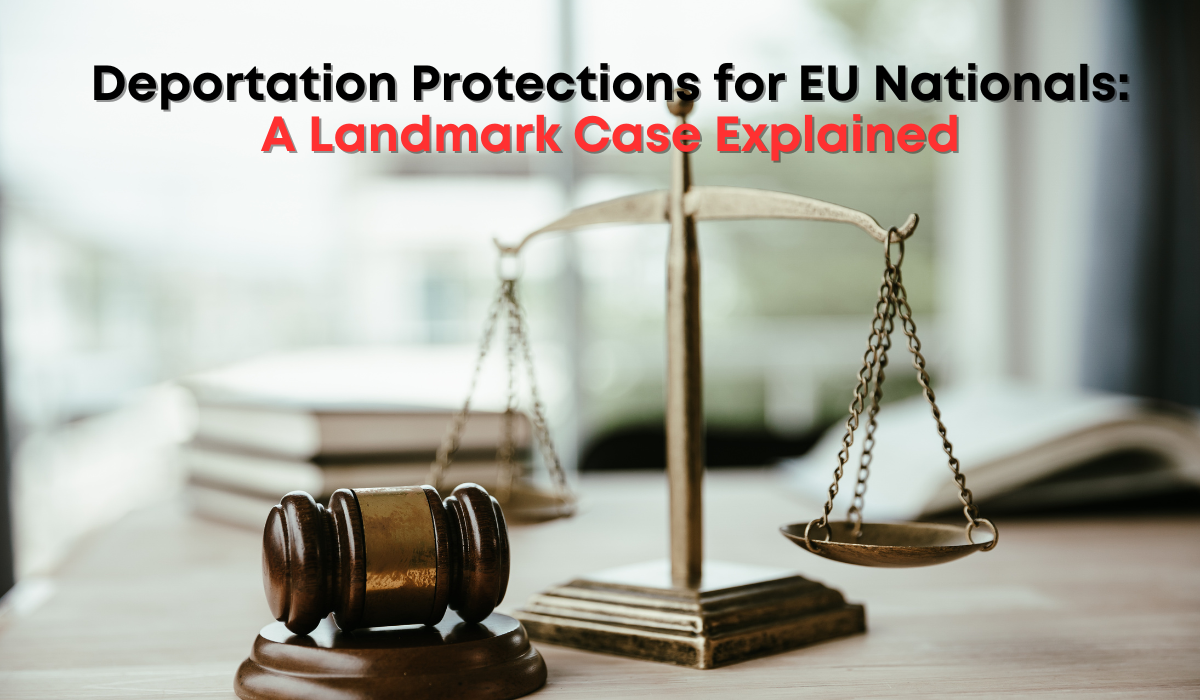The recent decision in Secretary of State for the Home Department v William George [2024] EWCA Civ 1192 has underscored the distinct deportation protections afforded to European Union (EU) nationals under UK law, even post-Brexit. This pivotal case has highlighted the importance of legal thresholds, procedural rigor, and the nuanced interplay between public policy and individual rights.
The Legal Landscape Post-Brexit
Although the UK’s exit from the EU ended freedom of movement, the Immigration (European Economic Area) Regulations 2016 (the “2016 Regulations”) remain a key framework governing deportation protections for European nationals. These protections, depending on the length of residence, significantly raise the bar for deportation compared to other foreign nationals.
Under the 2016 Regulations:
- European nationals with less than 10 years of residence can be deported on “grounds of public policy, public security or public health” (Section 23(6)).
- Those with 10 or more years of residence can only be deported on “imperative grounds of public security” (Section 27(4)).
Crucially, these decisions must be proportionate and consider the individual’s conduct, which must present “a genuine, present and sufficiently serious threat affecting one of the fundamental interests of society” (Sections 27(3), 27(5)(a),(c)).
The George Case: A Turning Point
William George, a Belgian national, moved to the UK at the age of 8 and lived here for over a decade before being convicted of manslaughter in 2017, following his involvement in a gang-related killing. Despite serving a 12-year sentence, George posed no risk of reoffending, as found by the Upper Tribunal. Nevertheless, the Home Office sought to deport him, arguing that his past conduct—specifically, his involvement in a “brutal killing”—constituted sufficient grounds under the 2016 Regulations.
The Home Office’s case hinged on an argument rooted in the Bouchereau test, derived from R v Bouchereau (Case 30/77) [1978] 1 QB 732. This test allows deportation based on past conduct alone if it meets the threshold of “deep public revulsion.” However, the Court of Appeal dismissed this argument, emphasizing that George, as a resident of over 10 years, was subject to the stricter “imperative grounds of public security” standard, which focuses on future risk, not past behavior.
Procedural Challenges and Judicial Observations
The Court of Appeal faced a key procedural question: could it consider a legal argument previously abandoned by the Home Office? Historically, this power exists in refugee cases under R (Robinson) v Secretary of State for the Home Department [1997] EWCA Civ 3090, allowing courts to raise unargued points of Refugee Convention law in the applicant’s favor.
The Home Office argued for an extension of this principle, asserting that their abandoned argument regarding Bouchereau was “Robinson obvious” and merited consideration in the interests of justice. While the Court agreed to address the argument due to its significance, it criticized the Home Office’s procedural handling, warning against future lapses of this nature.
Ultimately, the Court upheld George’s appeal, concluding that the “imperative grounds of public security” test could not be met by past conduct alone, irrespective of its gravity.
Legal and Societal Implications
This judgment reaffirms the enhanced protections for long-resident European nationals, drawing a sharp distinction between deportation thresholds for EU and non-EU nationals. For EU nationals with over 10 years’ residence, deportation requires clear evidence of an “actual risk to public security,” as defined in LG (Italy) v Secretary of State for the Home Department [2008] EWCA Civ 190.
In contrast, non-European nationals remain vulnerable to deportation based on “deep public revulsion” stemming from past conduct, provided it meets the Bouchereau threshold of “grave offences” like severe violence or sexual abuse.
The case also underscores the importance of procedural rigor. While courts may occasionally intervene to consider unargued points, the Home Office’s missteps here drew stern criticism, signaling the judiciary’s expectation of higher standards in such cases.
What This Means for Affected Individuals
The George decision offers a vital precedent for EU nationals facing deportation:
- Document Long Residence: Demonstrating over 10 years of residence is critical to engaging the higher deportation threshold.
- Emphasize Integration: Evidence of societal integration and low risk of reoffending can significantly strengthen a case.
- Seek Early Legal Advice: Professional guidance ensures all legal protections are leveraged effectively.
For non-EU nationals, deportation protections remain comparatively limited, though avenues such as the “unduly harsh” test for family members or “very compelling circumstances” can still be pursued.
Reflecting on the Broader Context
The George case highlights the evolving balance between public interest and individual rights in deportation law. While ensuring public safety remains paramount, the judiciary continues to assert the principle of proportionality, particularly for individuals deeply integrated into UK society.
For practitioners, this judgment reinforces the need for robust legal arguments at every stage of proceedings. For policymakers, it raises questions about the consistency and fairness of deportation thresholds across different categories of foreign nationals.
As the UK continues to navigate its post-Brexit immigration framework, cases like George serve as a reminder of the complex interplay between legislative intent, judicial interpretation, and individual rights.
Get in touch: For a comprehensive understanding of your options or queries on UK immigration matters, contact GigaLegal Solicitors at 02074067654 or click here to book a no-obligation consultation with an immigration expert.


